
Prologue
|
Day 1 | Day 2
| Day 3 | Day 4
| Day 5 | Epilogue |
About Us | Home
Plooysburg | Douglas

Douglas
Day 1:
16 December 2005 FRIDAY
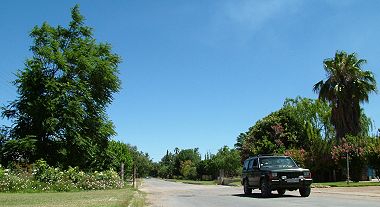 MI
pictured all Karoo towns to be quite small, but Douglas proved me
completely wrong. It’s a thriving, fast-growing town with lots of
culture. The centre of town was lined with shop after shop, and the
streets lined with beautiful deep green trees. Large gardens had low
walls with double story houses and families were seen strolling along
the streets pushing prams. It took us quite a while to drive through the
whole town to orientate ourselves and to see what the town consisted
off.
MI
pictured all Karoo towns to be quite small, but Douglas proved me
completely wrong. It’s a thriving, fast-growing town with lots of
culture. The centre of town was lined with shop after shop, and the
streets lined with beautiful deep green trees. Large gardens had low
walls with double story houses and families were seen strolling along
the streets pushing prams. It took us quite a while to drive through the
whole town to orientate ourselves and to see what the town consisted
off.
Thereafter we set of to look for a place to quench our thirst, and to
eat, because I had become hungry, and we had to look for a camping site,
but were unable to find one. I don’t think they have a campsite in
Douglas, because we couldn’t find one.
We were subconsciously aware of the apparent petrol shortage, so we
stopped at a garage to refill the Jeep, even though we never really
needed too. I climbed out and started speaking to the petrol-attendant
in English, only to realize that they actually speak Afrikaans to one
another.
Just next to the centre of town we came across a Bed and Breakfast, but
found two desperately lonely souls trying to create an atmosphere, and
who failed miserably, because we just could bear the thought of staying.
Since we actually wanted to find a fair number of locals to talk to, we
searched further and came across, the Geelhuis restaurant, where we
initially felt isolated amongst the local crowd of families who all
seemed to know one another. But by the end of the evening, or the early
morning rather, our table was surrounded by people and the hub of the
restaurant with Christmas carols playing the whole night long.
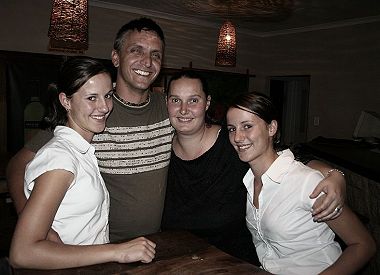 We
came to know the manager Nico right from the start, a very friendly
father of three kids. He spends his spare time in artwork, and some of
his paintings were seen hanging in the restaurant. He lives in Douglas
because he’s divorced and wanted to live in a peaceful neighbourhood
where he could relax. But that’s not exactly what he got, because our
waiter Louise had been at war with him for the past two days. Her armour
was a bucket of water. Somehow during the day she would sneak up to Nico
and totally drench him with it. But that night she met her fait, because
he was prepared!
We
came to know the manager Nico right from the start, a very friendly
father of three kids. He spends his spare time in artwork, and some of
his paintings were seen hanging in the restaurant. He lives in Douglas
because he’s divorced and wanted to live in a peaceful neighbourhood
where he could relax. But that’s not exactly what he got, because our
waiter Louise had been at war with him for the past two days. Her armour
was a bucket of water. Somehow during the day she would sneak up to Nico
and totally drench him with it. But that night she met her fait, because
he was prepared!
Everyone was minding their own
business and when she was once again at her tricks, he came running
around the corner after her with a whole bucket of ice water. We saw
them disappear out a back door and her scream of utter shock as he got
her drenched in ice water momentarily halted the whole restaurant. Some
laughter was heard echoing through the kitchen. The whole kitchen staff
came looking at her and cheered Nico with his success. Nico walked back
inside with a broad smile of contentment only to discover his wine glass
has disappeared. This was the work of Louise’s father who, during the
commotion, walked behind the bar and helped himself to beer and simply
took Nico’s wine glass and hid it underneath an empty wine bucket. But
it was clear all of them where just playing around and Nico did
eventually find his glass of wine. (NOTE: it is illegal for a manager to
drink on the job, so we just hereby wish to inform you that Nico wasn’t
actually working, he was only having his supper at his restaurant, and
after all, it was after hours.) We all had a good laugh and Louise
really took her revenge very well, because it wasn’t even 5 minutes or
maybe even less, before we saw her smiling and laughing again.
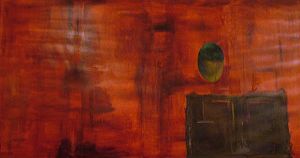 If
there ever was any tension amongst the people there, it was definitely
broken by Nico’s revenge because everyone started talking to one
another. We were told various stories, ranging from diamonds to ghosts.
We met a man who drives through South Africa in search of diamonds. He
told us that if we ever got the opportunity to fly and look at the Vaal
river from above and look down onto the river, we would be able to see a
variety of colours stretching along the embankment because of all the
different minerals in the area. Apparently it’s quite beautiful to see.
But ghost stories seemed to be more interesting and fascinated Etienne
immensely and only managed to raise the hair on my neck. These stories
stretched throughout most of the night and Nico was the first to tell us
of a ghost who made a windmill turn, called the Windpompspook. It didn’t
live very far from the restaurant that we were sitting in and Nico
thought that we should go there (to my discomfort), but fortunately (for
me) and unfortunately (for Etienne and a few others), the wind was
blowing too hard and we wouldn’t have been able to distinguish between
wind and ghost. It appeared on Pampoendraai road and in order to
communicate with the ghost you had to drive up to the windmill, put off
your lights and then flash them three times and wait a further five
minutes. The windmill would then automatically start to turn.
If
there ever was any tension amongst the people there, it was definitely
broken by Nico’s revenge because everyone started talking to one
another. We were told various stories, ranging from diamonds to ghosts.
We met a man who drives through South Africa in search of diamonds. He
told us that if we ever got the opportunity to fly and look at the Vaal
river from above and look down onto the river, we would be able to see a
variety of colours stretching along the embankment because of all the
different minerals in the area. Apparently it’s quite beautiful to see.
But ghost stories seemed to be more interesting and fascinated Etienne
immensely and only managed to raise the hair on my neck. These stories
stretched throughout most of the night and Nico was the first to tell us
of a ghost who made a windmill turn, called the Windpompspook. It didn’t
live very far from the restaurant that we were sitting in and Nico
thought that we should go there (to my discomfort), but fortunately (for
me) and unfortunately (for Etienne and a few others), the wind was
blowing too hard and we wouldn’t have been able to distinguish between
wind and ghost. It appeared on Pampoendraai road and in order to
communicate with the ghost you had to drive up to the windmill, put off
your lights and then flash them three times and wait a further five
minutes. The windmill would then automatically start to turn.
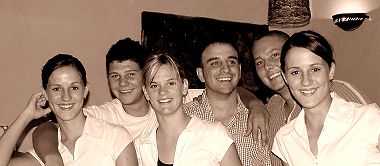 Nico
had gone there twice, on windless nights, just to prove to himself from
his first experience that these experiences really where true. They were
true. The first time he went there he actually screamed in fright. He
said he felt a strange sensation over him and a eerie atmosphere was all
around him. Nico didn’t look like a guy who would make up stories and
the other locals around us nodded in agreement to his descriptions, who,
most likely, had experienced the same thing. This led to conversations
about Kimberly ghosts. By the end of the conversation it sounded more
like Kimberly’s main population consisted of ghosts than of humans.
Apparently even ghost tours have been opened there. One young man around
our table was Dieter, who lived in Kimberly but drove all the way to
Douglas to socialize at this restaurant; he seemed to know quite a lot
about these ghosts. So it was quite evident that he had gone on these
tours and had seen with his own eyes at a graveyard how ghosts stood up
from their graves, apparently they where Chinese or Japanese. His
friends around him had been there too.
Nico
had gone there twice, on windless nights, just to prove to himself from
his first experience that these experiences really where true. They were
true. The first time he went there he actually screamed in fright. He
said he felt a strange sensation over him and a eerie atmosphere was all
around him. Nico didn’t look like a guy who would make up stories and
the other locals around us nodded in agreement to his descriptions, who,
most likely, had experienced the same thing. This led to conversations
about Kimberly ghosts. By the end of the conversation it sounded more
like Kimberly’s main population consisted of ghosts than of humans.
Apparently even ghost tours have been opened there. One young man around
our table was Dieter, who lived in Kimberly but drove all the way to
Douglas to socialize at this restaurant; he seemed to know quite a lot
about these ghosts. So it was quite evident that he had gone on these
tours and had seen with his own eyes at a graveyard how ghosts stood up
from their graves, apparently they where Chinese or Japanese. His
friends around him had been there too.
During these conversations I noticed Dieters’ table of friends were
constantly flirting with the waitresses. I was actually confused at one
point because the one waitress had two names and I just couldn’t figure
it out why they would talk to her by using two names and that she
actually responded to them. I actually thought they where drunk. But it
was only when I saw the two identical waitresses walking in, that I
realized that they where twins!
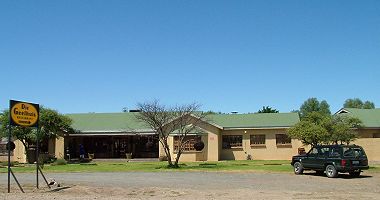 But
eventually our night (or early morning rather) had to come to an end and
we parted from our friends. It was actually me begging Etienne to call
the night a night, because from all the excitement of this trip my eye
lids where crawling on the floor. We stayed in the four star guesthouse
that was right next to the restaurant, Villa de Ghaap. You won’t be able
to miss it; it looks as if it is part of the restaurant. Our friends at
the restaurant told us that it was owned and run by the Ice-queen. I was
quite curious to see who she was, but when I met her she just seemed
quiet and reserved. She’s very young and had recently married, and was
actually very considerate to us, because when we looked for
accommodation on such a short notice, we called her and she drove from
quite far to organize something for us. The guesthouse was absolute
luxury compared to our forthcoming accommodation and I highly recommend
this guesthouse to any traveller. We had a very refreshing night, not
even the main road had disturbed our sleep where big trucks come driving
past, but they seemed to have crawled past the guest house at a snails
pace, because neither of us heard a single one.
But
eventually our night (or early morning rather) had to come to an end and
we parted from our friends. It was actually me begging Etienne to call
the night a night, because from all the excitement of this trip my eye
lids where crawling on the floor. We stayed in the four star guesthouse
that was right next to the restaurant, Villa de Ghaap. You won’t be able
to miss it; it looks as if it is part of the restaurant. Our friends at
the restaurant told us that it was owned and run by the Ice-queen. I was
quite curious to see who she was, but when I met her she just seemed
quiet and reserved. She’s very young and had recently married, and was
actually very considerate to us, because when we looked for
accommodation on such a short notice, we called her and she drove from
quite far to organize something for us. The guesthouse was absolute
luxury compared to our forthcoming accommodation and I highly recommend
this guesthouse to any traveller. We had a very refreshing night, not
even the main road had disturbed our sleep where big trucks come driving
past, but they seemed to have crawled past the guest house at a snails
pace, because neither of us heard a single one.
Nico Heyneke – 072 299 8852
Dieter – 082 434 3979
* * * * *
A short history:
Doulgas was one of South Africa’s
first missionary stations which where established in 1838 at a drift
over the Vaalriver by Isaac Hughes from the London missionary society.
Water from the Vaal is being used to irrigate Lucerne, corn, cotton and
potatoes fields near the town. Fruit and vegetable seeds are also
produced; there’s a variety of (diamantdelwelrye) along the river; and
saltpans. 33km to the southeast, is the largest salt producing pan in
the land.
Additional Pictures:
![]()
Forgotten
Towns of the Karoo
Web Design © CoZania.co.za
March 2006



